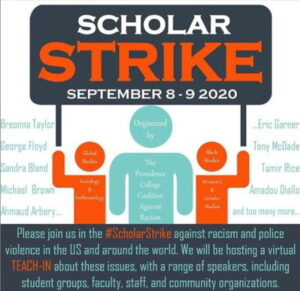by Kyle Burgess on September 17, 2020
Campus
by Sydney Olinger ’23
News Staff
On Sept. 8-9, members of colleges, universities, and their surrounding communities took part in a nationwide strike to promote racial justice. These two days were reserved for people to choose to refrain from their duties and spread awareness regarding the racial tensions in our nation. This event was open to anyone and everyone who wants to participate in promoting anti-racism.
The Providence College Coalition Against Racism, along with members of Black, global, Latin American, women and gender studies, sociology, and anthropology, hosted two Zoom calls during the two days of the strike. Over one hundred people joined the call to listen and learn.
During these virtual meetings, guest speakers ranging from PC faculty to young high school students, spoke about their experiences with racial injustice and strategies and actions to make drastic change within both their communities and the country as a whole.
“As we live through a pandemic that has disproportionately impacted people of color, and Black people in particular, and watched as George Floyd and others were murdered in our streets, it has never been more urgent to understand and dismantle racist institutions, and to stop engaging in racist practices,” stated Dr. Jessica Mulligan, a professor in the health policy and management department.
Though racism is a significant issue for many reasons, the main focus of this particular strike and discussion was tackling the problem of racism in schools, whether that be elementary, high school, or higher education institutions.
Dr. Anthony Rodriguez, a professor in the elementary and special education department and one of the guest speakers, discussed his observations of racial injustice on college campuses. Rodriguez explained that public safety officers are simply doing their job and following orders from those in higher and professional positions at institutions.
He mentioned that professors call on public safety officers for issues involving Black and Brown students far too often and for things that can be simply dealt with in the classroom. “We as teachers can do better, and to be honest, in the right system, we will do better. But, it should start with the higher education programs that train them. . .We [the higher education programs] plant the seeds of deficit-oriented thinking before they even enter any classroom and have any harm on any student,” remarked Rodriguez.
Younger individuals are also recognizing the need to take a stand against racial injustice. Younger generations have come together with their schools and communities to promote this change.
Sixteen-year-old Jaychele Nicole, executive director of Gen Z We Want to Live, based in Providence, is just one example of the many young activists in our community taking action to change the way school administrators and students view the issue of racism. Gen Z We Want to Live is a youth-run organization dedicated to building a coalition of skilled, young activists prepared to fight for their generation through youth advocacy and political influence.
Nicole proposes three “things to remember” in order to be a successful activist within the PC community, using the acronym FFF: function, funding, and feasibility. Function focuses on whether a solution comprehensively addresses the problem, funding emphasizes making sure a project has the money to run, and lastly, feasibility is important to determine whether a project will be impactful and if people will support it. These are only a few of the powerful speakers who shared their insight, passion, and determination to mend the broken parts of our communities and country.
As faculty and administrators work to improve the education system in which they work, students in the younger generations work diligently to ensure that it is done right. The Scholar Strike lasted only two days, but the issues discussed and progressive actions taken by students and faculty will continue to be not only discussed, but acted upon for years to come.
